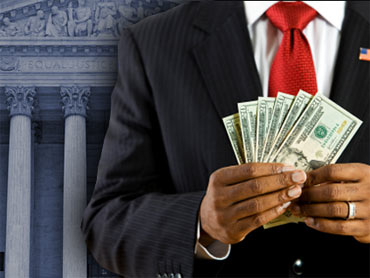Campaign spending doesn't guarantee victory, but it does boost the clout of special interests

It takes serious chutzpah to argue that money makes no difference in politics, since some of the smartest and wealthiest people in the country find investing in political candidates so appealing. But David Brooks, in his New York Times column this week, argues that the money doesn't really matter all that much when it comes to winning or losing on the campaign trail.
"Over the past year, the Democrats, most of whom are incumbents, have been raising and spending far more than the Republicans," writes Brooks. "Despite this financial advantage, Democrats have been sinking in the polls."
The columnist has conveniently ignored the impact of the recent Supreme Court decision in the Citizens United case, though. Because of this 5-4 precedent setting verdict by the court, money can now pour into politics that is neither raised nor spent by candidates or parties. Another Times writer, online op-ed contributor Tim Egan, notes that the kind of special interest funding permitted under Citizens United is running 9 to 1 in favor of Republicans. Writing from Colorado, which he calls "ground zero for what is happening in (Supreme Court Chief Justice) John Robert's America," Egan describes the new brand of politics as practiced out west:
"The sludge flow from out-of-state, secretive political groups is unrelenting. All hours. All mediums. A football game-break brings three attacks in a row, calling a senator a liar, a vandal and a glutton for debt. A weather update is interrupted by a trio of hits from the other side, making the challenger out to be the worst thing for women since Neanderthal man took up a club as an accessory to romance."
Brooks counters that the media blitz "isn’t persuasive; it’s mind-numbing. No wonder voters tune it all out. Amid this onslaught, there is no way a slightly richer ad campaign is going to make much difference."
For a media-savvy reporter, Brooks seems unusually clueless about the effectiveness of mind-numbing advertising – the kind that makes brand names "top of mind" for consumers. Such classics as "Squeeze the Charmin" and "Ring Around the Collar" may have been detested by television viewers, but they were effective enough to sell plenty of toilet paper and laundry detergent. What's most important in advertising – political and otherwise – is repetition. The exact nature of the message is secondary. It's a simple equation – the more available money, the larger the ad buy and the greater the name recognition for a given candidate.
We have very little data that would predict the long-term impact of the Citizens United case, but statistics tells us that there's a mounting cost to electioneering, and that money buys more than votes – it buys influence. So politicians who have to beg for contributions just to maintain a competitive edge over their opponents will be less likely to vote counter to the interests of their direct or indirect benefactors.
After all, businesses and their shareholders expect a return on their investment. From a corporate point of view, the Supreme Court has opened the doors to "the best government money can buy." And the special interests are all in for the lion's share.




